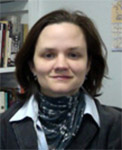Review | IN THE AMBER CHAMBER by Carrie Messenger (Moldova)
 In an Amber Chamber, Stories
In an Amber Chamber, Stories
Carrie Messenger (Moldova 1994–96)
Brighthorse Books
260 pages
August, 2018
$16.95 (paperback)
Reviewed by Eugénie de Rosier (Philippines 2006-08)

Carrie Messenger (Moldova 1994–96)
Carrie Messenger’s short stories paint dark and disturbing settings for people who lived in Eastern Europe under strangling communism. Romania and Moldova are noted. The former’s Ceaușescu brutalized his country. Famine was a scourge in the 1940s and in the 1980s, deprivation was widespread; and state enforced-pregnancy led to too many children that couldn’t be supported by their parents. The government opened orphanages which were run by people who seemed unaware of children’s needs. Themes of despair, loss, and vulnerability run through these 18 stories, but there are also uplifting moments . . . when a child’s laugh can be heard, a dog’s bark echoes in frolic, the surprise of a holiday in a new free country.
About the stories
In Edgewater, three Romanian women, who only know each through living in the same Chicago apartment building, share a brief, meager acquaintanceship. Each is unhappy with her choice — about not choosing Germany, or not staying home to teach, or marrying the wrong man. Through their varying perspectives, the foreignness of other immigrants rears its head and implodes on them in a public place.
The amusing How the Romanians Ruined Christmas brings us a family of five who’ve been sponsored by a generous synagogue community in Skokie. The newcomers’ worry about folks back home, the kids’ are put off by their mispronounced names at school, the youngest misses her street dog, the artist student can’t draw the way the teacher directs, and they are puzzled over the odd way Americans don’t play soccer. Mamica got headaches and she had to rest and pull the shades. Daddy’s an orderly at the hospital. The kids have adventures on the two flat’s fire escape ladder, and dad brings home a Christmas tree. Surely the synagogue will hear about the tree, says Mamica.
Then by turns, Messenger switches to imaginative, outlandish fantasy In the Amber Chamber. Its unknown narrator’s even inflection relays the story of a childless couple and their pursuit for a baby. It took them time to realize the Amber Chamber was missing, but how does a room get misplaced is the question that opens the story. In that time of war, the average villagers had to outfox the Nazis, Soviets and the Stasi, and residents became increasingly adept at stealth. The man and the woman set out to find the Amber Chamber and the adventure begins.
Four stories offer spookiness reminiscent of Grimm’s fairy tales and are reported by one or both of the brothers . . . addressed as “Comrade Grimm.” They describe dense forests, isolated children, empty villages, people shriveled with starvation. Themes of illness, threatening adults, cannibalism, disappearances, and lost or absent love play out in this mix of real and difficult living.
Another switch came with the 1939 Kansas black blizzards in Children in the Time of Dust and Underground Pastry that brought the reader to Verna in outer space. These two stories intrigued, but struck me as better suited in another collection.
The Poetess Writes Unanswered Letters and South 1144 focus on love and a kind of devotion to lost love – a struggle to unravel how each situation went wrong. Two late-thirties Romanian romantics of the late 1880s were devoted to poetry, or at least fame. A mid-teen Calcutta girl, who wants to be a poet, was part of a family hosting a 23-year-old Romanian, studying Bengal in the 1930s. He wants to be a language professor and was intent on going to America. Do we hear Sir Walter Scott whisper his pithy phrase: “Oh what a tangled web we weave . . .”?
Messenger, with a voice of someone who’s walked through old and dusty villages, uses humor, imagination, . . . and imperturbability well. The characters are believable. Metaphor and hyperbole influence her style. Vivid imagery and descriptive word choice enliven the emotional impact of her stories. Still, I was sometimes put off by the wordiness, as I lost the threads of many sentences. Most often though, I cared enough about the story to reread, because I wanted to know how it ended for the characters.
About the author —
This is Messenger’s first book. She was educated at Yale and the University of Iowa, and accomplished Peace Corps service in Moldova. She worked in Romania on a Fulbright grant and has published stories in a score of journals. Her experience includes two fellowships: the McDowell Colony and the Virginia Center for the Creative Art, and this book won the 2017 Brighthorse Prize for a short story collection.
•
About the reviewer —

Eugénie Rosier (Philippines 2006-08)
Eugénie de Rosier’s writing has appeared in the Huffington Post, Antioch Review, Big Muddy, Two Serious Ladies, Hurricane Alice and Sojourners, Ariel Chart International, and her commentaries have appeared in the Chicago Tribune and elsewhere. Eleven years as a State of Minnesota writer brought her numerous first-place awards from the National Association of Government Communicators. A former Norcroft Writers’ resident, her short story collection was a finalist in Holy Cow! Press’ only collection contest, 2018.
She holds a BA and MA and is pursuing a publisher for an essay collection and a short story manuscript. An able athlete, de Rosier has swum Turkey’s Hellespont Strait, 2013; walked the 500-mile Camino alone from the south French Pyrenees across north Spain to its Santiago City/Atlantic Ocean terminus, 2016; received many gold medals in power-walk racing, 2019, 2021, and 2022 Minnesota Games. In 2011, she accepted a Distinguished Alumni honor, the Humanitarian Award, from the University of Minnesota, for her Peace Corps service in the Philippines from 2006 to 2008 as a small business development specialist. As requested by her community, Eugénie worked on an indigenous water development project in the mountains.
No comments yet.
Add your comment